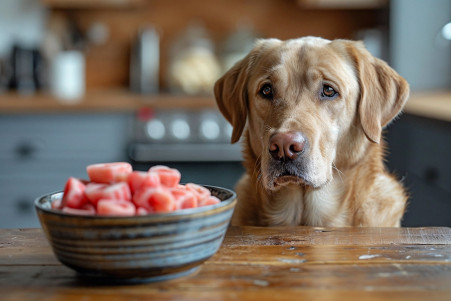Are Yak Chews Safe for Dogs? What Pet Owners Need to Know
20 May 2024 • Updated 18 May 2024

If you've ever questioned whether or not yak chews are safe and healthy for your dog, you're not alone. Yak chews have become increasingly popular, but they've also come with some questions and concerns. In general, yak chews are safe for dogs, but there are some important caveats. Yak chews are safe as long as they are given to dogs under supervision and in moderation. Yak chews are made from hardened yak and cow milk, and they can help satisfy a dog's natural chewing instinct while lasting longer than many other chews and edible treats. However, they can also pose a choking hazard and even lead to tooth fractures if a dog tries to consume them too quickly.
In this article, we'll take a deep dive into the research that's been done by veterinary professionals, pet nutritionists, and animal behaviorists to help you understand when it's safe to give your dog yak chews. We'll also cover their nutritional content, the risks associated with giving them to your dog too often, and how to determine the right size and hardness based on your dog's breed, age, and chewing style. Armed with this information, you'll be able to decide whether or not you want to add this popular treat to your dog's diet.
Are Yak Chews Safe for Dogs?
How to Introduce Yak Chews to Dogs
When you first give your dog a yak chew, it’s important to do so slowly. Not all dogs will like them, and some may even have allergies or sensitivities to the ingredients, even though yak chews are generally safe and easy to digest.
To introduce your dog to yak chews, let them sniff and chew on a small piece for a few minutes while you watch them closely, as suggested by Dogsee Chew. This will help you make sure that their digestive system can handle the new treat. Make sure to watch for any signs of digestive upset, such as vomiting or diarrhea, and stop giving your dog yak chews if you notice any of these symptoms.
It’s also important to make sure that you choose the right size and hardness for your dog’s breed, age, and chewing style. For example, smaller dogs and older dogs may need chews that are more flexible and less hard to avoid dental problems. If you’re worried about giving your dog yak chews, talk to your vet. They can help you figure out the best way to introduce yak chews to your dog based on their individual needs.
Yak Chews for Dogs: Benefits and Risks
Yak chews are a protein-packed, long-lasting treat that can have a number of positive impacts on your dog's health. According to Mighty Paw, yak chews are low in lactose and sugar and high in protein, calcium, vitamin D, and omega-3 fatty acids. The chews' rough texture can also help keep teeth and gums clean, and the act of chewing can help keep your dog's mind engaged.
On the other hand, as mentioned by Preventive Vet, yak chews can be too hard for some dogs and can cause broken teeth or pose a choking hazard if they're eaten too quickly. Value Pet Supplies also notes that dogs should be supervised while eating yak chews and that pet parents should be on the lookout for any potential allergic or digestive reactions.
In order to find the best chew for your dog, you'll want to take into account your dog's size, chewing habits, and dietary restrictions. The following section will offer tips on how to choose the best natural chews for your dog.
How to Choose the Best Chew for Your Dog
When choosing a chew for your dog, you should take into account your dog’s size, age, chewing habits, and dietary restrictions. As noted by The Spruce Pets, aggressive chewers may benefit from harder chews such as antlers or slow-cured beef bones, while less aggressive chewers can handle softer, more digestible chews.
In addition to yak chews, other natural chews to consider include bully sticks, dried fish skin, dental chews, and freeze-dried animal parts such as tendons and beef cheeks, as pointed out by All The Best Pet Care. However, Preventive Vet warns against very hard chews or rawhide, which can be dangerous for some dogs.
No matter what type of chew you choose, it’s important to supervise your dog while they’re chewing to make sure they don’t choke or experience other digestive issues, according to the Star of Texas Veterinary Hospital. By taking your dog’s specific needs into account and picking the right chew, you can help your dog safely meet their natural chewing needs while also supporting their dental and mental health.
How Long Do Yak Chews Last?
Yak chews are often praised for their long-lasting qualities, with most lasting hours or even days, depending on the dog's chewing style. According to Tibetan Dog Chew, the size and hardness of the chew, as well as the dog's chewing strength, can all affect how long a yak chew will last.
Himalayan Pet Supply explains that if stored properly, yak chews can last up to 5 years, which is seven times longer than a bully stick. To ensure the longest life, yak chews should be stored in an airtight package and kept away from extreme temperatures.
The color and smokiness of yak chews can vary based on the production process, according to Tibetan Dog Chew. The darker the chew, the closer it was to the smoke source during production, while lighter chews were further away. This difference in appearance is a result of the 45,000 farmers who use a variety of smoking techniques to make these natural treats.
Although yak chews are longer-lasting than many other dog chews, they aren't as durable as antlers or slow-cured beef bones, which is mentioned in the Tibetan Dog Chew blog. Still, it's important for dog owners to supervise their pets while they're eating yak chews to ensure they're safe and to watch for any dental or digestive issues.
Conclusion: How to Decide About Yak Chews
Yak chews can be a safe and beneficial treat for dogs when given under the right conditions and with proper supervision. It's important to consider factors such as the dog's age, size, chewing habits, and any dietary restrictions when selecting a yak chew. Gradual introduction and monitoring for any adverse reactions are recommended when first giving yak chews to a dog.
While yak chews offer nutritional and dental benefits, they should be given in moderation and with caution to avoid potential risks like choking or tooth fractures. Owners should weigh the pros and cons of yak chews and consider alternative natural chew options based on their dog's individual needs.


